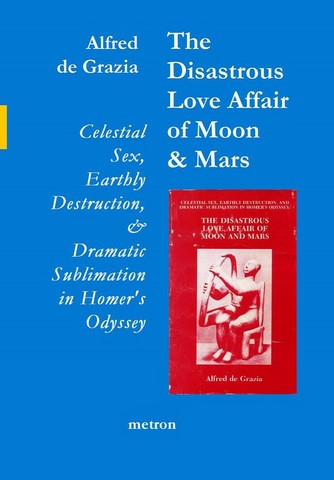The Disastrous Love Affair of Moon and Mars, by Alfred de Grazia
Celestial Sex, Earthly Destruction and Dramatic Sublimation in Homer's Odyssey
The theory to be expressed here is hardly believable. We discern behind a famous Homeric scenario about the misconduct of the gods the shadow of a second scenario of astronomical catastrophe. By pursuing the connection relentlessly, many reasons are uncovered to suspect that the human drama is unconsciously imitating what the human eye witnessed as a prior catastrophe in the skies. Chant and catastrophe, dance and disaster seem to be historically linked.
Can a dance and poem be a piece of astronomical history, tightly, not vaguely, related? If they are, then an idea that many psychologists have considered: that humans have a tendency to suppress the memory of terrible events, but also are somehow compelled by unconscious psychic forces to reenact the events - this idea is supported by our theory.

The lyric tells of a much longer opera ballet sung and directed by the sightless bard, Demodocus, who, some say, is Homer's self-image. The recital plays to a fascinated audience at the palace of Alcinous and to his guest, Odysseus, or Ulysses, hero of the War against Troy.
I asked myself what spirit breathed into Homer and saw that it was the goddess Pallas Athena. Athena moved the Homeric Age. She led the Greeks in the Iliad and guided Odysseus through his many adventures of the Odyssey. I found her everywhere. She dominated the skies as a phenomenon, and human strife on Earth.
I concerned myself with the context of the song and discovered that it was a Holy Dreamtime song, not a sacrilegious burlesque. It was presented as an opera-ballet, meant to take place among the gods in heaven. The same art form exists today among the aborigines of Australia.
I asked myself how such holy songs could arise, and found an answer in the modern theory of catastrophism. Precedents and parallels from many countries and cultures justify searching for catastrophism behind the lines of the love song of Demodocus. Greek culture was badly damaged by natural disasters of the eight and seventh centuries before this era, and Homer's poetry (which I place later than is usual) shows both the effects of the disasters and the ways in which the Greeks recovered from them.
Alfred de Grazia, Introduction
Catastrophe and Sublimation


